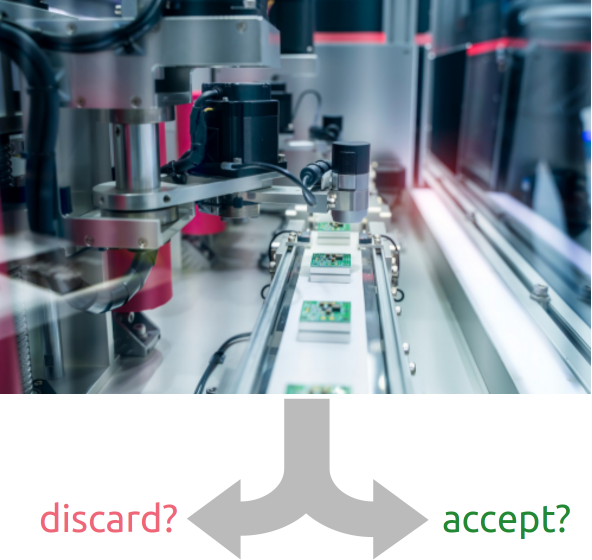1 Accept or discard?
\(\DeclarePairedDelimiter{\set}{\{}{\}}\) \(\DeclarePairedDelimiter{\abs}{\lvert}{\rvert}\)
Let’s start with a question that could arise in an engineering problem:
A particular kind of electronic component is produced on an assembly line. At the end of the line there is an automated inspection device that works as follows on each new component:
The inspection device first performs some tests on the component. The tests give an uncertain forecast of whether that component will fail within its first year of use, or after.
Then the device decides whether the component is accepted and packaged for sale, or discarded and thrown away.
Consider also the following context. When a new electronic component is sold, the manufacturer has a net gain of 1$. That’s the net gain if the component works for at least a year. But if the component instead fails within a year of use, the manufacturer incurs a net loss of 11$ (12$ loss, minus the 1$ gained at first), owing to warranty refunds and damage costs to be paid to the buyer. When a new electronic component is discarded, the manufacturer has 0$ net gain.
Now we have a new electronic component, just come out of the assembly line. The tests of the automated inspection device indicate that there is a 10% probability that the component will fail within its first year of use.

Should the inspection device accept the new component? or discard it?
Try to give and motivate an answer:
- Should the inspection device accept or discard the new component?
It doesn’t matter if you don’t get the correct answer; not even if you don’t manage to get an answer at all. The purpose here is for you to do some introspection about your own reasoning.
Then examine and discuss the following points:
Which numerical elements in the problem seem to affect the answer?
Can these numerical elements be clearly separated? How would you separate them?
How would the answer change, if these numerical elements were changed? Feel free to change them, also in extreme ways, and see how the answer would change.
Could we solve the problem if we didn’t have the probabilities? Why?
Could we solve the problem if we didn’t know the various gains and losses? Why?
Can this problem be somehow abstracted, and then transformed into another one with completely different details? For instance, consider translating along these lines:
- inspection device → computer pilot of self-driving car
- tests → camera image
- fail within a year → pedestrian in front of car
- accept/discard → keep on going/ break